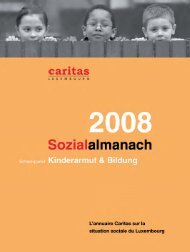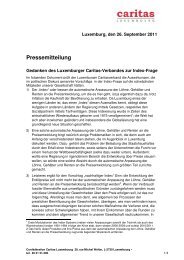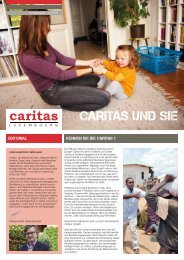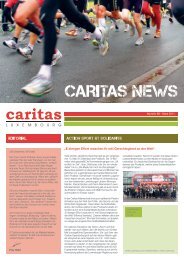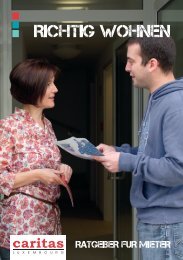Sozialalmanach - Caritas Luxembourg
Sozialalmanach - Caritas Luxembourg
Sozialalmanach - Caritas Luxembourg
You also want an ePaper? Increase the reach of your titles
YUMPU automatically turns print PDFs into web optimized ePapers that Google loves.
thinking. The discipline of economics will have to shed its ‘hard science’ pretentions,<br />
and accept its role in the ‘social sciences’. It will have to become more modest too. But<br />
this is easier said than done – an entire generation has been brought up to believe in the<br />
concept of the efficient market. Institutions will continue to cling to this concept, and<br />
a paradigm shift will be more difficult than recent revelations would justify, especially<br />
since alternative constructs are not readily available.<br />
Paul de Grauwe intimates that perhaps the root cause of this academic oversight<br />
was the error of modern mainstream economics in believing that the economy is<br />
simply the sum of microeconomic decisions of rational agents. The profession of<br />
economics was so caught up in this rational actor and market efficiency paradigm<br />
that it completely forgot some of the most elementary dynamics of economic crises:<br />
animal spirits. Fundamental to Keynesian economics is the idea that instead of rational<br />
actors, much economic activity is governed by animal spirits, best understood as<br />
waves of optimism and pessimism 39 . Left to their own devices, capitalist economies<br />
will experience manias, followed by panics. It is the function of the modern state to<br />
sail into the wind of these excesses: when the population over-spends, they should<br />
over-save, and vice versa. In the evolution of the paradigm shift from Keynesianism to<br />
monetarism and rational expectation macroeconomics, the study of animal spirits has<br />
almost completely disappeared from mainstream macroeconomics, and the economics<br />
of finance. When expectations are assumed to be rational, intellectual models little<br />
room for waves of pessimism and optimism to exert an independent influence on<br />
economic activity. As time went on, more and more professional economists were drawn<br />
onto the bandwagon of passive acceptance of the dominant intellectual paradigm.<br />
Most academic economists shied away from probing the underlying vulnerabilities of<br />
loose macroeconomics, financial deregulation, mortgage and pension markets, and<br />
distorted incentives and bonus schemes in the big financial institutions that exacerbated<br />
economic instabilities. Moreover, the high level of sub-disciplinary specialisation in<br />
the field of economics made it difficult for any single academic to put together all the<br />
pieces. This intellectual inertia and sub-specialisation blinded academic economists<br />
to the underlying causes of the crisis. In this respect, the current crisis is a wakeup<br />
call, re-introducing the concepts of animal spirits, imperfect information, cognitive<br />
limitation, and heterogeneity in the use of information, back into macroeconomic and<br />
financial market modelling and analysis.<br />
39 Grauwe, De (2008); see also Akerlof & Shiller (2009).<br />
165



